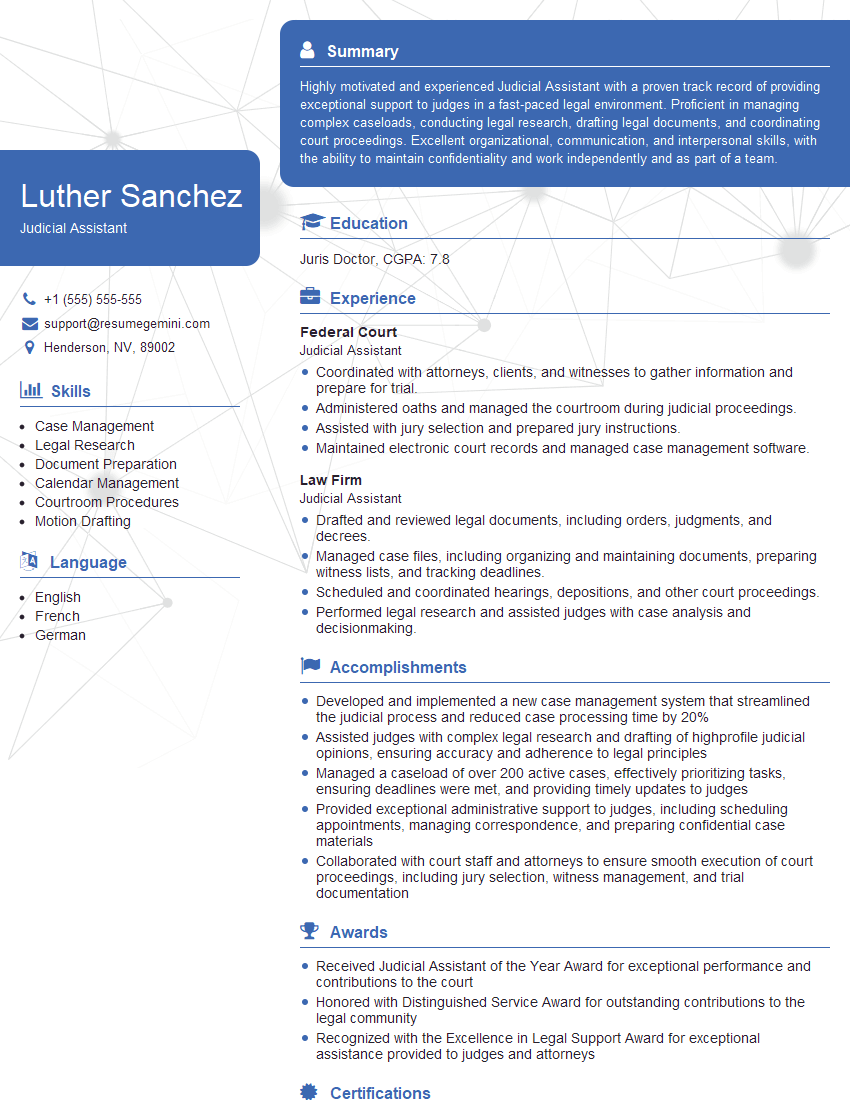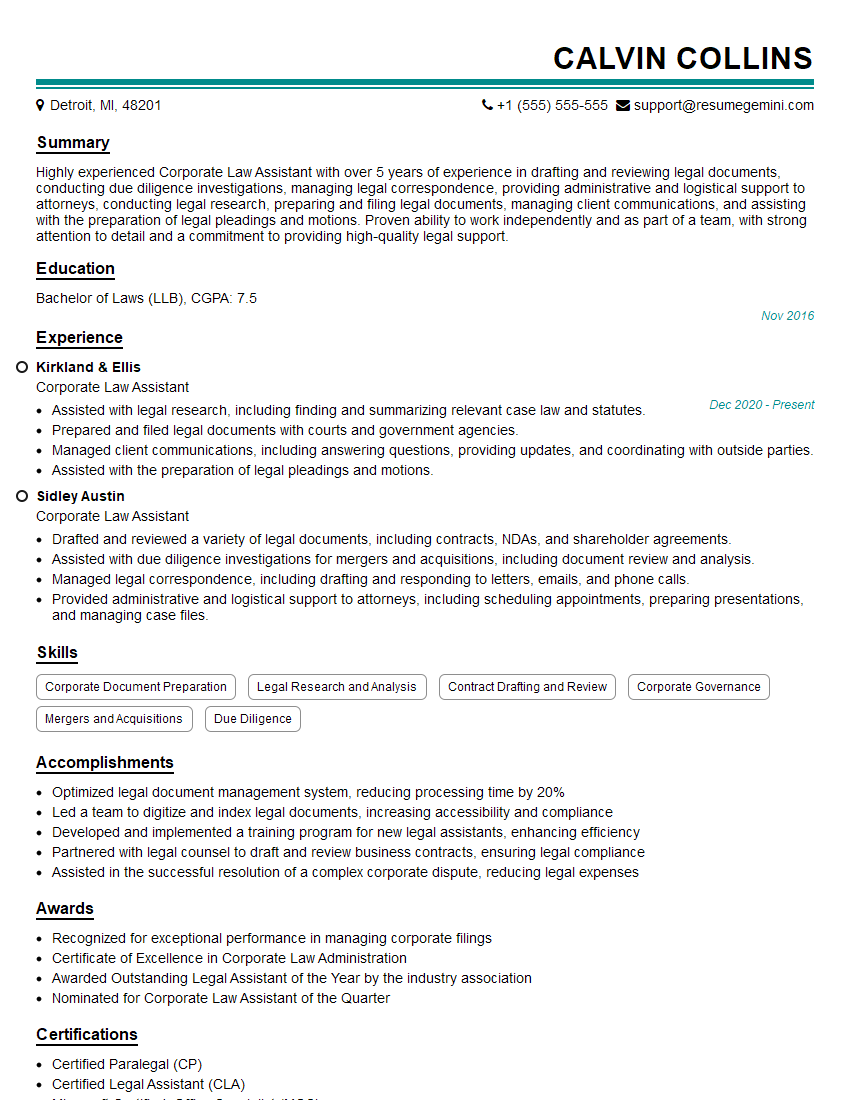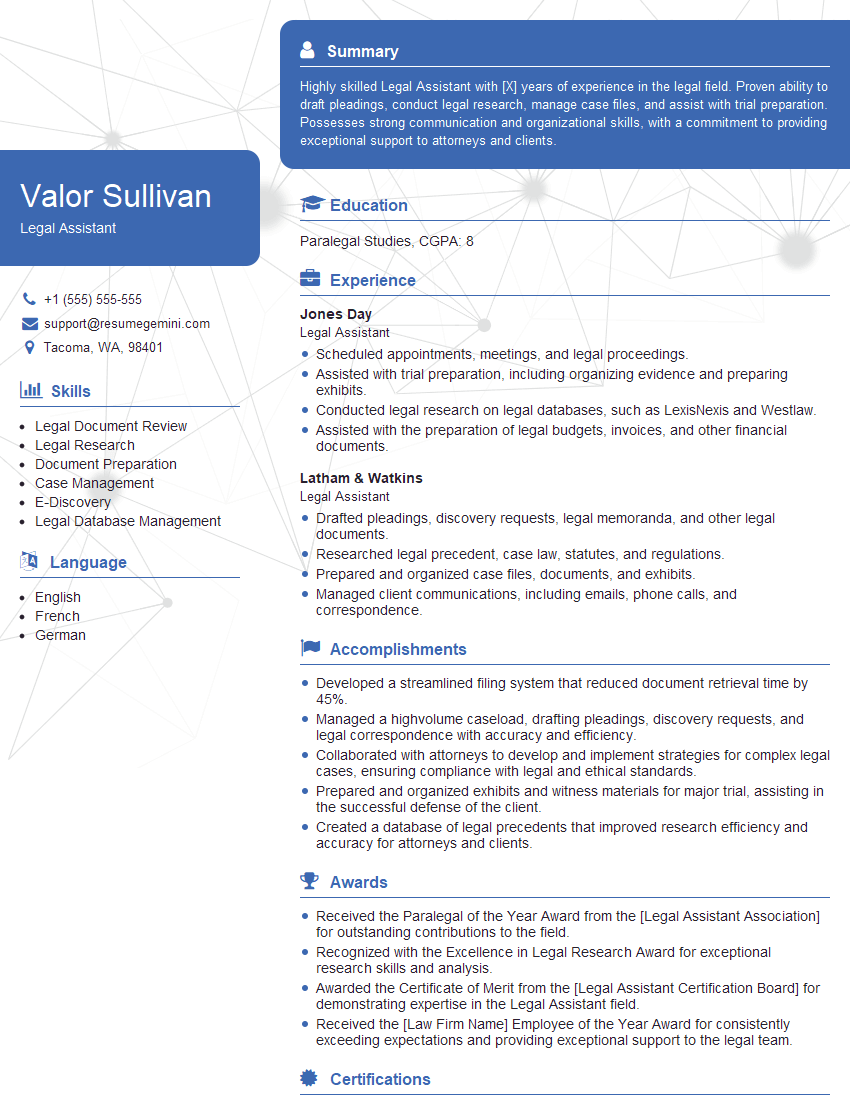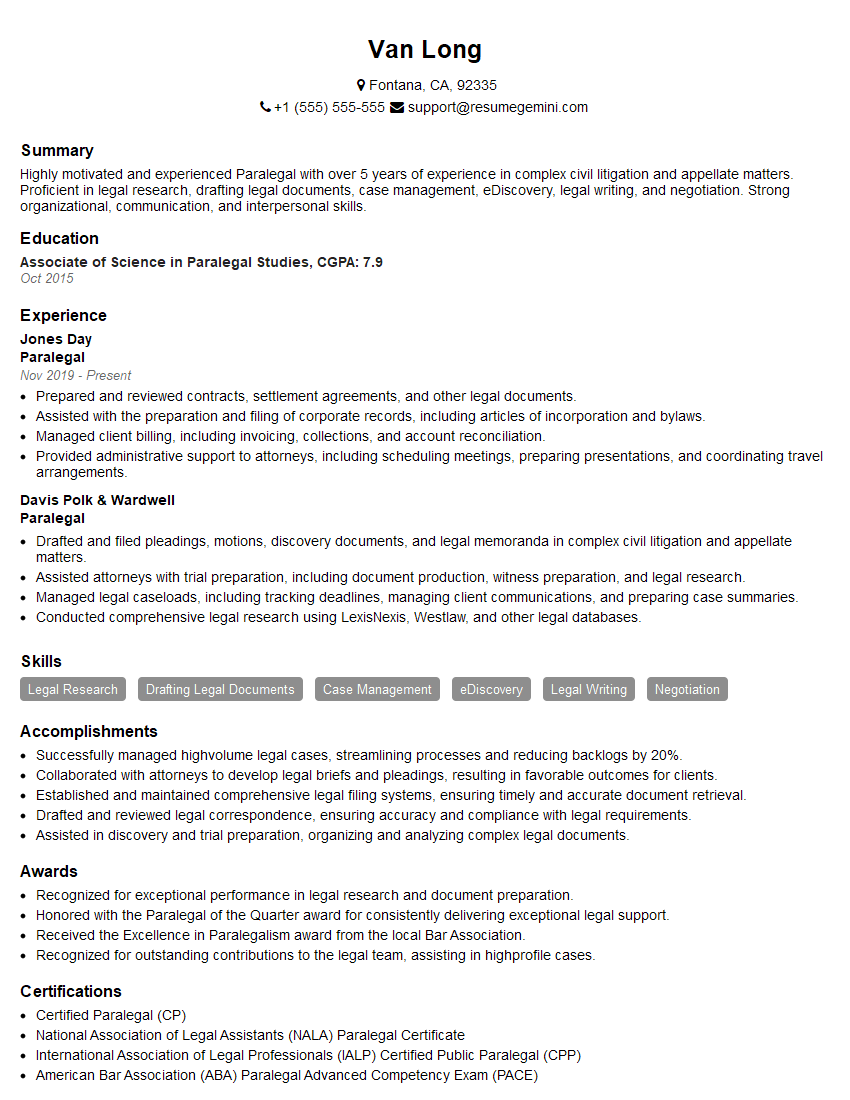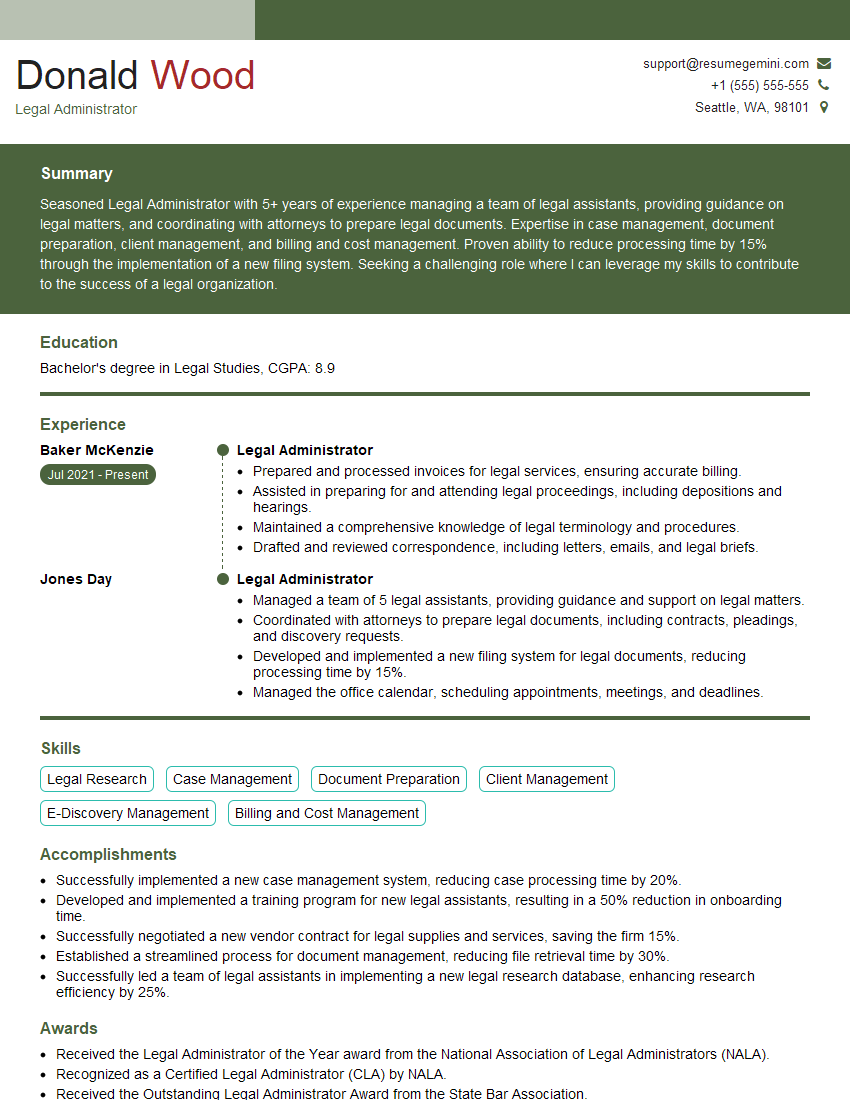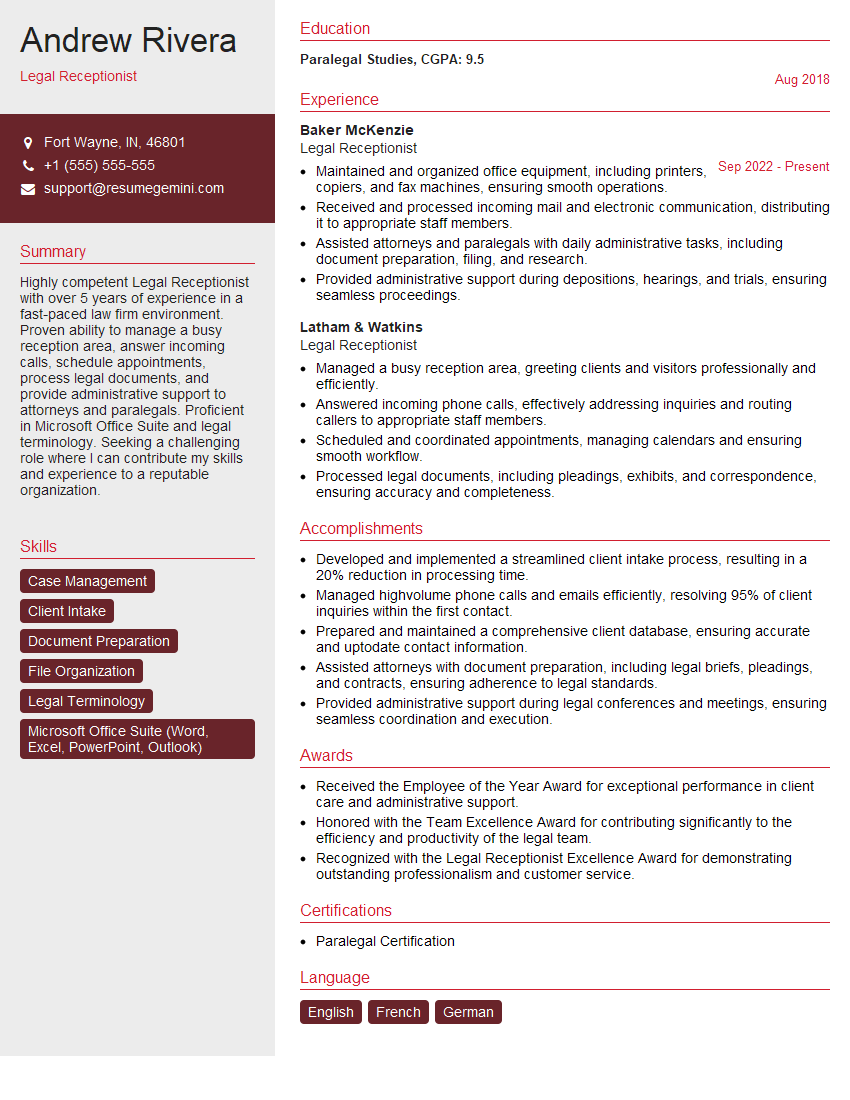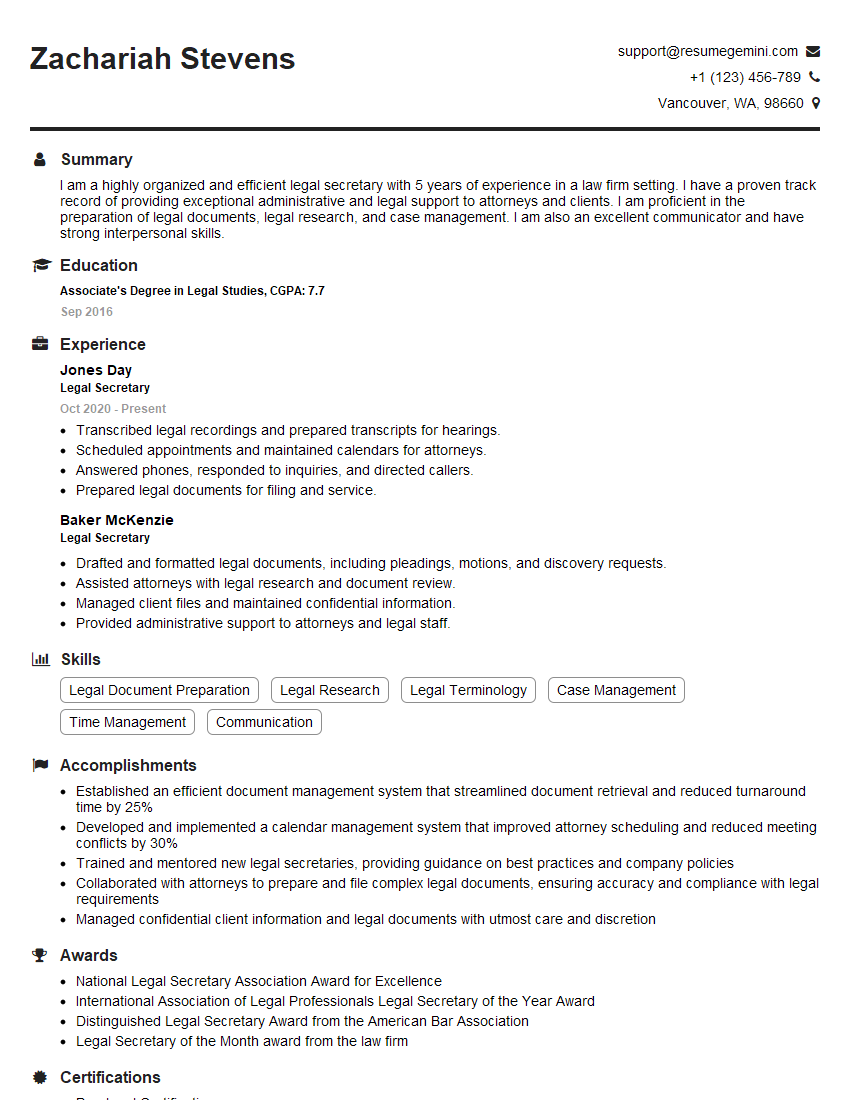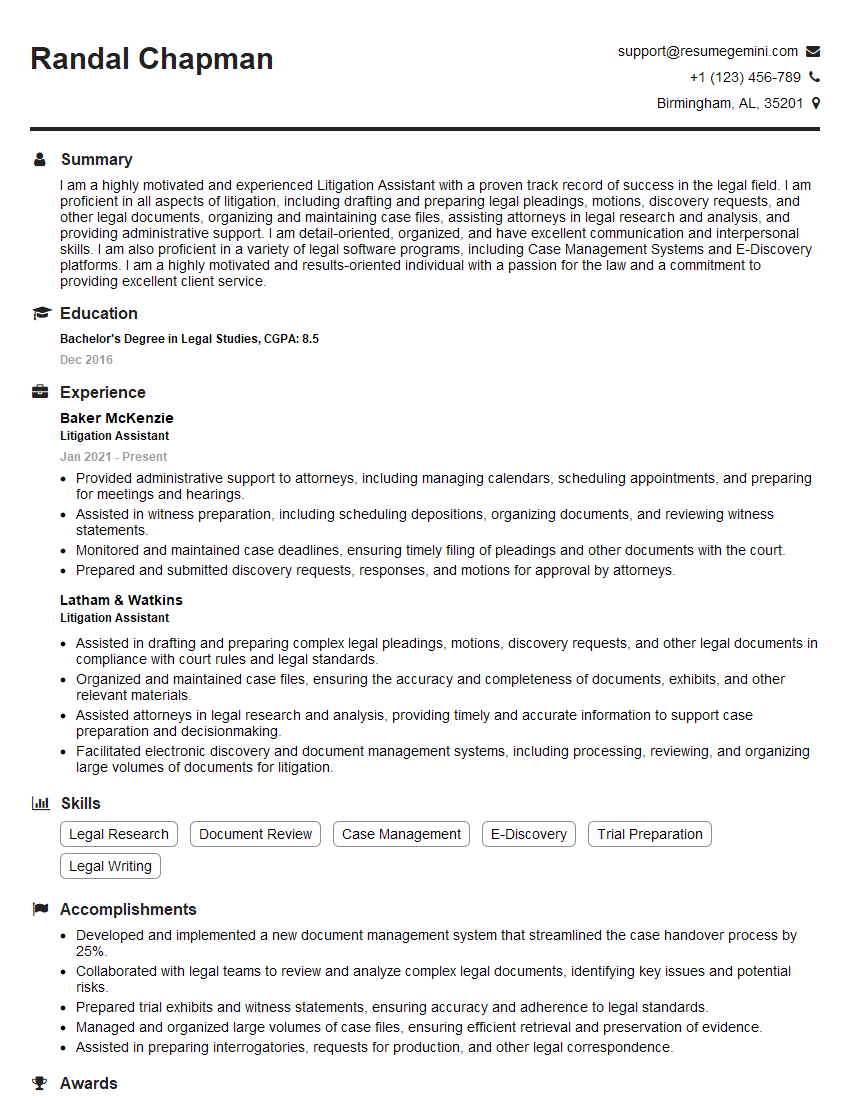The thought of an interview can be nerve-wracking, but the right preparation can make all the difference. Explore this comprehensive guide to Attorney Assistance interview questions and gain the confidence you need to showcase your abilities and secure the role.
Questions Asked in Attorney Assistance Interview
Q 1. Describe your experience with legal research using Westlaw or LexisNexis.
I possess extensive experience conducting legal research using both Westlaw and LexisNexis. My proficiency extends beyond basic keyword searches; I’m adept at utilizing Boolean operators (AND, OR, NOT) to refine searches, navigating citators to verify case validity and identify subsequent case law, and leveraging advanced search techniques like Natural Language searching and headnotes to efficiently locate relevant precedents. For instance, while working on a breach of contract case, I used Westlaw’s KeyCite to confirm the precedential value of a key case and uncover any subsequent rulings that might affect its applicability. I also regularly use LexisNexis’ analytical tools to identify trends and patterns in case law relevant to my client’s needs. This allows me to provide comprehensive and up-to-date legal analysis.
Furthermore, I’m comfortable working with various legal databases and utilizing their respective features, including the ability to save and organize research for future reference and generate comprehensive research reports.
Q 2. How proficient are you in Microsoft Office Suite (Word, Excel, PowerPoint, Outlook)?
I’m highly proficient in the Microsoft Office Suite. My skills encompass advanced features in Word, such as creating complex legal documents with consistent formatting, utilizing styles, and generating tables of contents and authorities. In Excel, I can manage large datasets, create spreadsheets for tracking case deadlines and expenses, and generate pivot tables for data analysis. I frequently utilize PowerPoint to create compelling presentations for clients and colleagues, including charts, graphs, and visual aids to effectively communicate complex legal information. Finally, Outlook is essential for managing my communications, including scheduling meetings, tracking emails, and efficiently organizing my inbox. For example, I recently used Excel to track multiple client deadlines across several different cases, ensuring none were missed.
Q 3. Explain your experience with e-filing procedures in your jurisdiction.
My experience with e-filing procedures in [State Jurisdiction – Replace with Specific Jurisdiction] is extensive. I am well-versed in the specific requirements and procedures of the state’s electronic filing system, including formatting requirements, acceptable file types, and the process for submitting documents, paying fees, and monitoring case status. I understand the importance of ensuring accurate and timely filings to avoid delays or sanctions. I’ve successfully e-filed hundreds of documents, ranging from simple motions to complex appeals, and I’m familiar with troubleshooting common technical issues that may arise during the e-filing process. I routinely check for updates and changes to the system’s rules and guidelines to maintain compliance.
For example, I once successfully navigated a complex e-filing issue involving a large document submission that initially failed due to a technical error. By systematically diagnosing the problem, researching the system’s technical documentation, and contacting the court’s technical support team, I successfully resolved the issue and ensured timely filing of the documents, avoiding a potential deadline miss.
Q 4. What is your experience with managing attorney calendars and scheduling meetings?
Managing attorney calendars and scheduling meetings is a crucial part of my daily responsibilities. I utilize various calendar management systems, including Outlook and shared calendars, to maintain an accurate record of attorney appointments, court hearings, client meetings, and deadlines. I am skilled in coordinating complex schedules, factoring in travel time, time zone differences, and individual attorney preferences. I proactively identify potential scheduling conflicts and work to resolve them efficiently, ensuring smooth workflow and minimal disruption. My approach focuses on minimizing conflicts and maximizing the attorneys’ time.
For instance, I recently managed the schedules of five attorneys across three different time zones for a multi-state litigation case. This involved coordinating depositions, hearings, and client meetings while ensuring all attorneys had adequate preparation time. I effectively used shared calendars and communication tools to streamline the process and avoid scheduling conflicts.
Q 5. How do you prioritize tasks and manage deadlines in a fast-paced legal environment?
In a fast-paced legal environment, effective prioritization and deadline management are paramount. I employ several strategies, including utilizing task management software, creating prioritized to-do lists, and adhering to a strict time management system. I begin by identifying tasks based on urgency and importance using methods like the Eisenhower Matrix (Urgent/Important). This helps me focus on high-priority, time-sensitive matters while still addressing less urgent tasks in a timely manner. Proactive communication with attorneys and clients about potential delays or impending deadlines is also essential. I consistently monitor deadlines and proactively address potential obstacles to prevent delays.
For example, during a high-pressure trial preparation period, I utilized project management software to track multiple deadlines across multiple cases. This software’s automated reminders and visual progress tracking enabled me to proactively address potential roadblocks and ensure all deadlines were met efficiently. I also prioritized client communication to keep them informed of the progress and any potential adjustments to the timeline.
Q 6. Describe your experience with preparing legal documents, such as pleadings or motions.
I have significant experience in preparing various legal documents, including pleadings, motions, discovery requests, and responses, briefs, and contracts. My expertise lies in ensuring documents are meticulously drafted, adhering to all relevant rules of court and legal formatting standards. I am proficient in using various legal document software and templates, ensuring accuracy, consistency, and compliance with jurisdictional requirements. I’m also adept at incorporating specific legal citations and factual details in a clear and concise manner. I pay close attention to detail, ensuring that the documents are free of grammatical errors and typos, which is critical for maintaining credibility and professionalism.
For instance, I once prepared a complex motion for summary judgment that involved extensive legal research and meticulous citation. The motion was ultimately successful, in part due to the clear, well-organized, and legally sound manner in which it was presented. My careful attention to detail throughout the document preparation process contributed significantly to its success.
Q 7. How familiar are you with legal terminology and concepts?
My familiarity with legal terminology and concepts is comprehensive. Through years of experience, I’ve developed a deep understanding of legal principles, procedures, and terminology across various areas of law, including [mention specific areas of law you are familiar with – e.g., contract law, tort law, civil procedure]. I can confidently understand and utilize terms like voir dire, res judicata, stare decisis, and numerous other legal concepts. I also possess a strong understanding of the rules of evidence and civil procedure, which is essential for preparing and filing legal documents and assisting in litigation matters.
I continuously expand my legal knowledge through ongoing research, participation in professional development opportunities, and by staying abreast of legal updates and changes in the law. This ensures my continued proficiency in using and understanding legal terminology, enabling me to effectively assist attorneys in their work.
Q 8. Describe your experience with managing client communication and correspondence.
Managing client communication is paramount in ensuring smooth legal proceedings and maintaining client satisfaction. My approach involves a multi-faceted strategy incorporating various communication channels tailored to individual client preferences and the urgency of the matter.
For instance, I routinely handle email correspondence, ensuring prompt responses and clear, concise communication. I also utilize phone calls for urgent matters or situations requiring immediate clarification. For complex updates or lengthy explanations, I often prepare detailed written summaries or reports. In cases involving sensitive or confidential information, I always adhere to strict security protocols, often employing encrypted communication methods.
For example, in one case involving a high-profile merger, I managed daily email updates to multiple stakeholders, ensuring consistency in messaging and maintaining complete transparency. This involved coordinating schedules, prioritizing urgent requests, and using a dedicated email system for that particular case to maintain organization. I also ensured that all correspondence was appropriately documented and archived according to firm policy.
Q 9. How do you handle confidential information in a legal setting?
Confidentiality is the bedrock of legal practice. Handling confidential information requires meticulous adherence to ethical guidelines and firm policies, along with the practical application of security measures. My experience includes rigorous training in data protection protocols and a deep understanding of attorney-client privilege.
This means I strictly limit access to confidential information on a need-to-know basis, using secure file storage systems, password protection, and encryption where necessary. I never discuss client matters in public spaces, and I ensure that all physical documents are stored in locked cabinets. I am always careful about disposing of documents, following established protocols for shredding or secure electronic deletion.
For example, I’ve handled sensitive financial documents involving high-net-worth individuals, ensuring the utmost confidentiality by using encrypted email and secure file sharing platforms. I have also actively participated in firm-wide training on data breach prevention and incident response.
Q 10. What is your experience with litigation support tasks, such as document review or trial preparation?
My litigation support experience encompasses a wide range of tasks, from comprehensive document review to meticulous trial preparation. I’m proficient in utilizing various e-discovery tools and techniques for efficient and accurate document management. My skills include advanced search techniques, data filtering, and the production of privilege logs.
In document review, I’m adept at identifying key pieces of evidence, organizing them logically, and analyzing them for relevance to the case. During trial preparation, my contributions include assisting in the creation of exhibits, organizing witness testimony, and preparing trial notebooks. I also have experience with trial presentation software, helping streamline the presentation of evidence in court.
For example, in a recent complex commercial litigation case, I reviewed over 100,000 documents, using Relativity to identify key exhibits and assist in the creation of chronologies and timelines used in court. My attention to detail ensured no relevant document was overlooked, which significantly contributed to the case’s success.
Q 11. How comfortable are you working independently and as part of a team?
I am equally comfortable working independently and as part of a team. My experience has shown me the strengths of both approaches. Working independently allows me to focus intently on tasks requiring concentration and precision, like detailed document review or legal research. My organizational skills and self-motivation ensure that deadlines are consistently met even when working autonomously.
However, I’m also a highly collaborative team player. I believe in open communication and actively contribute to team discussions, sharing my expertise and insights to help achieve shared goals. I can effectively work with attorneys and other support staff, adapting my communication style to different personalities and work preferences. I find that team collaboration often leads to more creative problem-solving and better outcomes.
For instance, in one case, I independently researched complex legal precedents, while collaborating with other team members to consolidate findings and prepare a comprehensive brief.
Q 12. Explain your experience with legal billing and timekeeping software.
I have extensive experience with various legal billing and timekeeping software, including widely used programs like Clio, MyCase, and PracticePanther. My expertise extends beyond basic data entry; I understand the importance of accurate and detailed time tracking to ensure efficient billing and accurate financial reporting. I am familiar with different billing methods, including hourly rates, flat fees, and contingency fees.
I am proficient in generating client invoices, tracking expenses, and managing trust accounts. My skills also include generating reports on time entries, billable hours, and unbilled receivables. I can create customized reports to meet specific needs and can identify potential billing discrepancies. I understand the importance of accurate billing for maintaining client trust and the financial health of the firm.
In a previous role, I implemented a new billing system, resulting in a significant improvement in billing efficiency and reduced time spent on administrative tasks.
Q 13. How would you handle a demanding or difficult attorney?
Handling demanding or difficult attorneys requires a combination of professionalism, diplomacy, and effective communication. My approach centers around maintaining a calm and respectful demeanor, even under pressure. I actively listen to their concerns, clarify expectations, and efficiently address their requests. I prioritize proactive communication to avoid misunderstandings and prevent issues from escalating.
It’s important to remember that attorneys often operate under significant stress, and understanding this context is crucial. I approach each situation with empathy while maintaining professional boundaries. I focus on providing accurate information, supporting them with my expertise, and ensuring that tasks are completed to the highest standards. I am committed to finding solutions rather than creating conflict.
For example, I once supported an attorney known for his demanding style, successfully navigating their intense workflow by maintaining meticulous organization and proactively anticipating their needs. My ability to anticipate problems and provide solutions effectively defused tension and fostered a positive working relationship.
Q 14. Describe your experience with maintaining organized case files, both physical and electronic.
Maintaining organized case files is critical for efficient case management and smooth legal operations. My experience includes utilizing both physical and electronic filing systems, applying consistent naming conventions and organizational structures to ensure easy retrieval of information. For physical files, I maintain a color-coded system for easy identification and access.
For electronic files, I leverage cloud-based platforms and document management systems to ensure accessibility and security. I adhere to strict naming conventions to maintain consistency and easily locate specific documents. I regularly back up electronic files to prevent data loss. I also employ a robust system for indexing and tagging electronic documents to facilitate efficient searching and retrieval.
For example, I once managed a high-volume case with hundreds of physical and digital files, creating a system that ensured all documents were easily accessible. This system, using a combination of color-coded folders and a precise electronic filing system, drastically reduced the time spent on document retrieval.
Q 15. What is your experience with transcription services?
Throughout my career supporting attorneys, I’ve extensively utilized transcription services, both in-house and through external vendors. My experience ranges from dictations of client communications and meeting notes to transcribing complex legal proceedings like depositions and court hearings. I’m proficient in selecting the appropriate service based on the urgency, complexity, and security requirements of the transcription. For example, confidential client information demands secure, HIPAA-compliant services, while less sensitive meeting notes might benefit from a more cost-effective, quicker turnaround option. I understand the importance of accuracy and have developed effective methods for reviewing and editing transcribed documents, ensuring their fidelity to the original audio or video source. This includes verifying proper spelling, punctuation, and the accurate representation of legal terminology.
Career Expert Tips:
- Ace those interviews! Prepare effectively by reviewing the Top 50 Most Common Interview Questions on ResumeGemini.
- Navigate your job search with confidence! Explore a wide range of Career Tips on ResumeGemini. Learn about common challenges and recommendations to overcome them.
- Craft the perfect resume! Master the Art of Resume Writing with ResumeGemini’s guide. Showcase your unique qualifications and achievements effectively.
- Don’t miss out on holiday savings! Build your dream resume with ResumeGemini’s ATS optimized templates.
Q 16. How do you handle errors in legal documents or filings?
Handling errors in legal documents requires a methodical and meticulous approach. My first step is to identify the nature and extent of the error. Is it a minor typographical error, a factual inaccuracy, or a more significant legal flaw? For minor errors, like a misspelled word, a simple correction is sufficient. However, for more substantial errors, particularly those with legal implications, I always involve the supervising attorney. We collaboratively assess the error’s impact and determine the best course of action. This often involves researching relevant legal precedents, consulting with other specialists if needed (like a paralegal or another attorney), and proposing several solutions to the attorney for their consideration and approval. We might amend the document directly, create a corrected version, or, in more severe cases, completely redraft sections. Maintaining a detailed audit trail of all corrections is crucial for transparency and accountability. This rigorous process minimizes the risk of legal repercussions and reinforces our commitment to accuracy and best practices.
Q 17. Describe a time you had to meet a tight deadline under pressure.
I recall a time when we had to prepare a comprehensive legal brief for an appeal within just 48 hours. The case involved a complex intellectual property dispute with a significant amount of technical detail. The pressure was immense, especially considering the potential consequences of missing the deadline. To manage this effectively, I collaborated closely with the attorney, dividing the work into smaller, manageable tasks. We prioritized the most critical sections of the brief, assigning them based on individual strengths. We implemented a strict schedule, with regular check-in points to ensure we stayed on track. This involved utilizing efficient tools for research and document collation, and constant communication to address any roadblocks promptly. Working diligently through the night and sacrificing some personal time, we managed to submit the completed brief well before the deadline. The successful appeal demonstrated the value of meticulous planning, collaborative teamwork, and unwavering dedication under pressure. It was a testament to our commitment to achieving results despite the limitations of time.
Q 18. What is your experience with preparing legal presentations or summaries?
I possess considerable experience in preparing legal presentations and summaries. This involves transforming complex legal information into concise, easily digestible formats. I’m adept at using various software programs, such as PowerPoint and Adobe Acrobat, to create visually appealing and informative presentations. My approach is to first thoroughly understand the legal arguments, evidence, and case law relevant to the topic. Then, I organize the information logically, structuring the presentation to support a clear narrative. I focus on using concise language, avoiding jargon whenever possible. Where technical terminology is unavoidable, I provide clear and simple explanations. For example, when presenting to a jury, I would avoid complex legal jargon and focus on a clear and concise summary of the case that is easy for them to understand. Visually, I use charts, graphs, and timelines to enhance comprehension. This approach ensures that the information is presented effectively, maximizing the audience’s understanding and retention.
Q 19. How do you ensure the accuracy and completeness of your work?
Ensuring accuracy and completeness is paramount in legal work. My approach involves multiple layers of quality control. First, I meticulously review all documents for clarity, consistency, and adherence to legal standards. This involves fact-checking, cross-referencing information, and using established legal citation methods. Second, I employ a methodical approach to document review, utilizing checklists to ensure all necessary components are included. Third, I always seek feedback from the supervising attorney, presenting my work for review and approval before submission. This collaborative approach provides an additional layer of verification, identifying potential errors or omissions. Finally, I maintain a comprehensive system for tracking and organizing documents to facilitate efficient retrieval and verification. These practices help to mitigate errors, improving the quality and reliability of my work.
Q 20. What are your strengths and weaknesses in relation to this role?
My strengths lie in my attention to detail, my ability to manage multiple tasks effectively, and my commitment to accuracy. I’m highly organized, efficient, and possess excellent communication skills. I thrive in collaborative environments, contributing effectively to team success. A weakness I’ve identified is a tendency to be perfectionistic. While this ensures high-quality work, it can sometimes lead to spending excessive time on minor details. I’m actively working on managing this by prioritizing tasks based on importance and delegating where appropriate. This approach allows me to maintain my commitment to excellence while managing my time more effectively.
Q 21. How do you handle conflicting priorities?
Conflicting priorities are an inherent part of working in a fast-paced legal environment. To handle these effectively, I use a prioritization matrix that considers the urgency and importance of each task. Urgent and important tasks are addressed immediately, while less urgent tasks are scheduled accordingly. I also utilize project management tools to track deadlines and allocate time effectively. Open communication with the attorney is essential; discussing competing priorities helps in setting realistic expectations and ensuring that crucial tasks are prioritized. I believe in proactive communication; if I foresee a potential conflict or delay, I promptly inform the attorney, proposing solutions to manage the situation effectively. Transparency and collaboration are crucial for navigating conflicting priorities successfully.
Q 22. What is your experience with various legal practice areas?
My experience spans several key legal practice areas. I’ve worked extensively in contract law, assisting attorneys with drafting, reviewing, and negotiating various agreements, from simple sales contracts to complex intellectual property licensing deals. For example, I helped a firm streamline their contract review process by developing a standardized checklist, resulting in a 20% reduction in review time. I also have significant experience in corporate law, including entity formation, mergers and acquisitions, and regulatory compliance. This involved managing extensive due diligence processes and preparing documentation for board meetings. Finally, I possess considerable experience in litigation support, assisting with discovery, evidence organization, and trial preparation. In one case, I helped organize thousands of documents for a complex antitrust lawsuit, ensuring the legal team had immediate access to relevant information when needed.
Q 23. Describe your proficiency in document management systems.
My proficiency in document management systems is a core strength. I’m adept at using various platforms, including Westlaw, LexisNexis, and cloud-based solutions like Dropbox and SharePoint. I’m not just proficient in using these systems; I understand how to optimize them for legal workflows. For instance, I’ve implemented metadata tagging systems within SharePoint to facilitate efficient document retrieval and organization. I can also create and manage complex folder structures, ensuring easy navigation and accessibility for multiple users. My skills extend to version control and e-discovery preparedness, ensuring compliance with legal and ethical requirements. I understand the importance of metadata and have experience using tools to ensure that crucial information about documents is captured and tracked.
Q 24. What strategies do you employ for efficient organization of legal documents?
Efficient organization is paramount in legal work. My strategy focuses on a combination of standardized naming conventions, meticulous folder structures, and leveraging the metadata capabilities of document management systems. For example, I always use a consistent naming convention – ‘Client Name_Case Number_Document Type_Date’ – to quickly identify and locate files. My folder structures are hierarchical and logical, reflecting the case’s chronology and subject matter. I use keywords and metadata tags to allow for quick searching and retrieval of information using advanced search functions. This system is particularly useful during discovery in litigation, allowing for the rapid identification and production of relevant documents. I also regularly review and purge outdated or irrelevant files, ensuring system efficiency.
Q 25. How familiar are you with different court systems and procedures?
I have a strong understanding of various court systems and procedures, both at the state and federal levels. This includes familiarity with rules of civil procedure, evidence rules, and local court rules. I understand the differences between state and federal court systems, and the specific procedures followed in each jurisdiction. I have experience with different court filings, including pleadings, motions, and appeals. My knowledge is not just theoretical; it’s informed by hands-on experience supporting attorneys in various court proceedings. For instance, I’ve assisted in preparing and filing motions in various jurisdictions, paying close attention to specific local court rules regarding formatting and filing deadlines.
Q 26. How do you maintain client confidentiality?
Maintaining client confidentiality is of utmost importance, and I adhere to strict protocols to ensure this. I understand and apply attorney-client privilege principles, and I’m familiar with relevant data privacy regulations such as HIPAA and GDPR where applicable. I use password-protected systems and encryption to safeguard sensitive information. Access to client files is strictly controlled, and only authorized personnel are permitted access. I consistently follow secure file-sharing practices and adhere to firm policies regarding data security. My commitment to confidentiality extends beyond technical measures; it’s ingrained in my professional conduct.
Q 27. What software programs are you proficient in using for legal assistance?
I’m proficient in a range of software programs crucial for legal assistance. My expertise includes Westlaw and LexisNexis for legal research; Microsoft Office Suite (Word, Excel, PowerPoint) for document creation and data analysis; and various document management systems, as mentioned previously. I’m also comfortable using Adobe Acrobat for PDF manipulation and e-signature tools for efficient document execution. Furthermore, I have experience with case management software, which allows me to track deadlines, manage cases, and monitor progress effectively. I am a quick learner and can adapt to new software as needed.
Q 28. Describe your experience with preparing and submitting legal briefs.
I have considerable experience in preparing and submitting legal briefs. This involves understanding the required format and structure, conducting thorough legal research to support arguments, and carefully drafting persuasive and well-organized documents. I understand the importance of clear and concise writing, as well as proper citation of legal authority using the appropriate citation style (e.g., Bluebook). I am familiar with different types of briefs, including appellate briefs, motions briefs, and amicus curiae briefs, each with its unique requirements. I have assisted attorneys in preparing briefs for various courts and have developed a keen eye for detail and adherence to strict deadlines. I understand the importance of proofreading to ensure accuracy and professionalism.
Key Topics to Learn for Attorney Assistance Interview
- Legal Research & Analysis: Understanding legal databases (Westlaw, LexisNexis), conducting thorough research, and synthesizing complex legal information into concise, actionable summaries.
- Document Management & Organization: Practical application includes proficiency in electronic filing systems, document review, and maintaining organized case files – crucial for efficient workflow.
- Client Communication & Interaction: Handling sensitive information with discretion, effectively communicating with clients (both in person and via email/phone), and maintaining professional demeanor.
- Calendar Management & Scheduling: Efficiently managing attorney schedules, coordinating appointments, and ensuring timely preparation for court appearances or client meetings.
- Litigation Support: Understanding the litigation process, preparing exhibits and documents for trial, and assisting with discovery processes.
- Case File Management: Organizing and maintaining detailed and accurate case files, adhering to firm protocols and ethical considerations.
- Technology Proficiency: Familiarity with various legal software, Microsoft Office Suite, and other relevant technologies crucial for efficient workflow.
- Legal Terminology & Procedures: Strong understanding of basic legal terminology and standard operating procedures within a law firm.
- Confidentiality & Ethics: Deep understanding and strict adherence to attorney-client confidentiality and professional ethical guidelines.
- Problem-Solving & Prioritization: Ability to prioritize tasks effectively, manage multiple deadlines, and solve problems proactively in a fast-paced environment.
Next Steps
Mastering Attorney Assistance skills is crucial for career advancement in the legal field, opening doors to diverse roles and opportunities for growth within law firms. A strong foundation in these skills demonstrates professionalism, efficiency, and a commitment to providing exceptional support. To significantly boost your job prospects, create an ATS-friendly resume that highlights your relevant skills and experience. ResumeGemini is a trusted resource to help you build a professional and impactful resume that will grab recruiters’ attention. Examples of resumes tailored to Attorney Assistance are provided to help you get started.
Explore more articles
Users Rating of Our Blogs
Share Your Experience
We value your feedback! Please rate our content and share your thoughts (optional).
What Readers Say About Our Blog
Hello,
We found issues with your domain’s email setup that may be sending your messages to spam or blocking them completely. InboxShield Mini shows you how to fix it in minutes — no tech skills required.
Scan your domain now for details: https://inboxshield-mini.com/
— Adam @ InboxShield Mini
Reply STOP to unsubscribe
Hi, are you owner of interviewgemini.com? What if I told you I could help you find extra time in your schedule, reconnect with leads you didn’t even realize you missed, and bring in more “I want to work with you” conversations, without increasing your ad spend or hiring a full-time employee?
All with a flexible, budget-friendly service that could easily pay for itself. Sounds good?
Would it be nice to jump on a quick 10-minute call so I can show you exactly how we make this work?
Best,
Hapei
Marketing Director
Hey, I know you’re the owner of interviewgemini.com. I’ll be quick.
Fundraising for your business is tough and time-consuming. We make it easier by guaranteeing two private investor meetings each month, for six months. No demos, no pitch events – just direct introductions to active investors matched to your startup.
If youR17;re raising, this could help you build real momentum. Want me to send more info?
Hi, I represent an SEO company that specialises in getting you AI citations and higher rankings on Google. I’d like to offer you a 100% free SEO audit for your website. Would you be interested?
Hi, I represent an SEO company that specialises in getting you AI citations and higher rankings on Google. I’d like to offer you a 100% free SEO audit for your website. Would you be interested?
good
